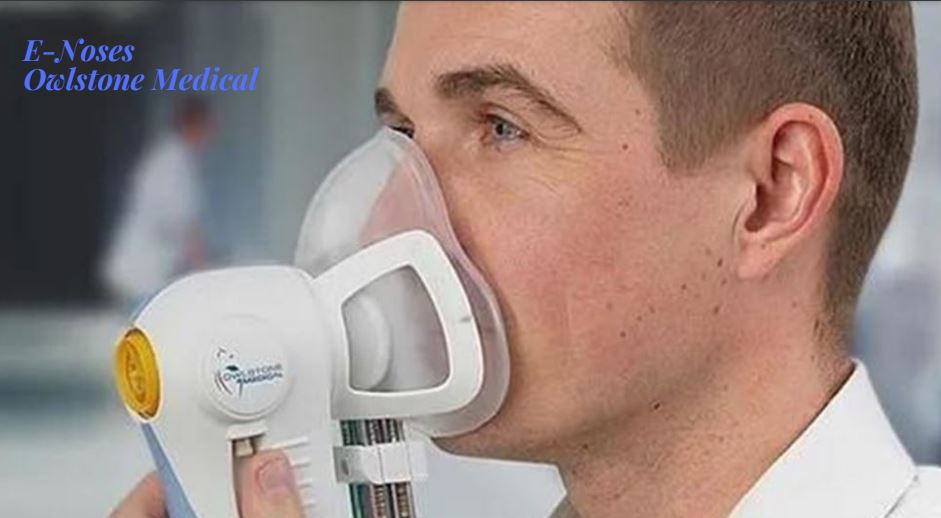The Develop of E-Noses
During the pandemic, many science centres, technology organizations and companies tried to tackle the coronavirus. One of the most interesting approaches to the prevention and early detection of the coronavirus and not only, was the idea of a device, an electronic nose. Let’s see how this idea started with what purpose and in how many different diseases it applies.
Implementations and investigations of past years
An electronic nose will be able to chemically detect the lungs of lung cancer patients, allowing it to predict which patients will respond to immunotherapy, according to new research. The scientific review “The Annals of Oncology” have shown that this e-Nose can predict the effectiveness of immunotherapy (mainly nivolumab or pembrolizumab) better than immunohistochemistry (a process in which antibodies are used to detect proteins (antigens) in an organ).
The researchers collected data from 143 patients from the Dutch Cancer Institute and used the device two weeks before the start of immunotherapy and three months afterwards to assess whether the patients were actually responding.
Other researchers in the Netherlands have created a portable electronic “nose”, which for the first time is able to detect – through the patient’s breath – the presence of “Barrett’s oesophagus”, a precursor to oesophageal cancer. The new cheap and non-invasive technique lasting just five minutes may in the future be a reliable diagnostic test for the disease.

The researchers, led by Professor Peter Sirsema of the Department of Gastroenterology and Hepatology at the Radbund University Medical Centre in Nijmegen, published their findings in the journal Gut, and conducted a clinical trial Barrett’s oesophagus, 141 gastro-oesophageal reflux and 132 were healthy.
Participants breathed for five minutes into the electronic “nose”, which – with the help of artificial intelligence – proved capable of “catching” the cases of “Barrett’s oesophagus” at a rate of 91%. The scientists stressed that “as the findings of the study show, patients with Barrett’s oesophagus have a different imprint of organic volatile substances on their breath than those without this condition.”
Although it is not yet clear how organic volatiles reflect early-onset cancer cell lesions in the oesophagus, the new test is as accurate as breast and bowel cancers. However, the findings will need to be confirmed by a much larger study already planned in 1,000 people, according to the researchers, who said they were optimistic that the electronic “nose” was promising to be used by doctors in two to three years.
AI in E-Noses
Scientists have developed a new electronic nose, capable of smelling the molecular signatures of difficult-to-detect pancreatic and ovarian cancers in vapours escaping from blood samples. The innovative test is based on a machine learning algorithm to detect unique combinations of volatile organic compounds in vapours from blood samples.
Researchers presented the method, last June, at a conference of the American Society of Clinical Oncology. The technology is based on artificial intelligence to distinguish problematic and benign combinations of volatile organic compounds. After training the algorithm, the researchers tested the electronic nose on plasma samples. Scientists used the test to analyse the blood of 20 patients with ovarian cancer, 20 with benign ovarian tumours and 20 volunteers without cancer. They also examined samples from 13 patients with pancreatic cancer, 10 with benign pancreatic disease and 10 volunteers without cancer. The electronic nose was able to distinguish ovarian cancers from benign tumours with 95% accuracy and pancreatic cancer cells with 90% accuracy. What impressed them was that they identified several cases of early-stage cancer.

As we understand the electronic nose is the new advanced weapon of science in the battle of diagnosing diseases. They are called “e-noses” (electronic noses) and are devices that in a non-invasive way try to detect, through the analysis of respiration, various diseases.
A pioneer in this field is the British company Owlstone Medical that created an electronic nose which is in the clinical trials for lung cancer and some other forms of cancer. There are two major clinical trials of this electronic nose, one in Britain and one in various European countries, involving thousands of volunteers and patients.



